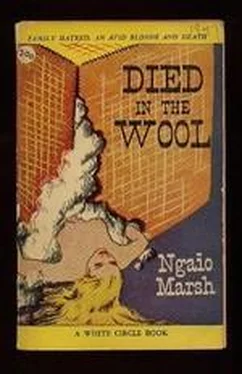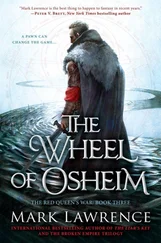Ngaio Marsh - Died in the Wool
Здесь есть возможность читать онлайн «Ngaio Marsh - Died in the Wool» — ознакомительный отрывок электронной книги совершенно бесплатно, а после прочтения отрывка купить полную версию. В некоторых случаях можно слушать аудио, скачать через торрент в формате fb2 и присутствует краткое содержание. Жанр: Классический детектив, на английском языке. Описание произведения, (предисловие) а так же отзывы посетителей доступны на портале библиотеки ЛибКат.
- Название:Died in the Wool
- Автор:
- Жанр:
- Год:неизвестен
- ISBN:нет данных
- Рейтинг книги:4 / 5. Голосов: 1
-
Избранное:Добавить в избранное
- Отзывы:
-
Ваша оценка:
- 80
- 1
- 2
- 3
- 4
- 5
Died in the Wool: краткое содержание, описание и аннотация
Предлагаем к чтению аннотацию, описание, краткое содержание или предисловие (зависит от того, что написал сам автор книги «Died in the Wool»). Если вы не нашли необходимую информацию о книге — напишите в комментариях, мы постараемся отыскать её.
Died in the Wool — читать онлайн ознакомительный отрывок
Ниже представлен текст книги, разбитый по страницам. Система сохранения места последней прочитанной страницы, позволяет с удобством читать онлайн бесплатно книгу «Died in the Wool», без необходимости каждый раз заново искать на чём Вы остановились. Поставьте закладку, и сможете в любой момент перейти на страницу, на которой закончили чтение.
Интервал:
Закладка:
“It’s the same old story, Ben,” said Fabian, “but we’re hoping Mr. Alleyn may get a bit further than the other experts. We’re lucky to have him.” Mr. Wilson glanced at Alleyn and then at the floor. He smoked cautiously, sheltering his cigarette with the palm of his hand. He had the air of a man whose life’s object was to avoid making the slightest advance to anybody.
“You were here for the January shearing when Mrs. Rubrick was killed, weren’t you, Mr. Wilson?” asked Alleyn.
“That’s right,” said Mr. Wilson.
“I’m afraid you must be completely fed up with policemen and their questions.”
“That’s right.”
“And I’m afraid mine will be precisely the same set of questions all over again.” Alleyn waited and Mr. Wilson, with an extremely smug expression, compounded, it seemed, of mistrust, complacency and resignation, said: “You’re telling me.”
“All right,” said Alleyn. “Here goes, then. On the night of January 29th, 1942 when Mrs. Rubrick was stunned, suffocated, bound, and packed into a wool bale in the replica of the press over there, you were in charge of the shed as usual, I suppose?”
“I was over at Lakeside,” Mr. Wilson muttered as if the statement were an obscenity.
“At the time she was murdered? Yes, you probably were. At a dance wasn’t it? But (you must forgive me if I’ve got it wrong) the wool-shed is under your management during the shearing, isn’t it?”
“Manner of speaking.”
“Yes. And I suppose you have a look round after knock-off time?”
“Not much to look at.”
“Those trap-doors or port-holes by the shearing board for instance. Were they shut?”
“That’s right.”
“But the traps could be raised from outside?”
“That’s right.”
“And the sacking over the door at the end of the board. Was that dropped?”
“That’s right.”
“Was it fastened in any way?”
“Fastened?”
“Fastened, yes.”
“She’s nailed to a bit of three-be-two and we drop it.”
“I see. And the pile of sacks or empty bales inside these rolling double doors — were they lying in such a way that anybody coming in or going out would disturb them?”
“I’ll say.”
“But in the morning, did they look as if they’d been disturbed?”
Mr. Wilson shook his head very slightly.
“Did you notice them particularly?”
“That’s right.”
“How was that?”
“I’d told the boys to shift them and they never.”
“Could the doors have been rolled open from outside?”
“Not a chance.”
“Were they fastened inside?”
“That’s right.”
“Is it remotely possible that there was somebody hiding in here when you knocked off?”
“Not a chance.”
“Mrs. Rubrick must have come in by the sacking door?”
Mr. Wilson grunted.
“She was very short. She couldn’t reach up to fit the baton on the cross-beam where it now rests. So she probably pushed it in a little way. Is that right, should you say?”
“Might be.”
“And her murderer must have gained entrance by the same means, if we wash out the possibility of shoving up one of the traps and coming in that way?”
“Looks like it.”
“Where was the branding iron left, when you knocked off?”
“Inside the door, on the floor.”
“The sacking door, that is. And the pot of paint was there too, wasn’t it?”
“That’s right.”
“Was the iron in its right place the next morning?”
“Young Cliff says it was shifted,” said Mr. Wilson in a sudden burst of loquacity.
“Had he put it away?”
“That’s right. He says it was shifted. It was him first drew attention to the thing. He put the police on to it.”
“Did you notice anything unusual that morning, Mr. Wilson? Anything at all, however trivial?”
Mr. Wilson fixed his pale blue gare upon a cluster of ewes at the far end of the paddock and said: “Look.” Alleyn looked at the ewes. “Listen,” Mr. Wilson continued. “I told Sergeant Clark what I seen when I come in and I told Sub-Inspector Jackson and they both wrote it down. The men told them what they seen and they wrote that down too, although it was the same as what I seen.”
“I know,” said Alleyn, “I know. It seems silly but I would rather like to hear it for myself now I’ve seen the place. You see, there was nothing new or confusing about a wool-shed to Clark and Jackson. They’re New Zealanders, dyed in the wool, and they understand.”
Mr. Wilson laughed surprisingly and with unexampled contempt. “Them?” he said. “They were as much at home in the shed as a couple of ruddy giraffes, those two jokers.”
“In that case,” said Alleyn with a mental apology to his colleagues, “I should certainly prefer to hear the story from you.”
“There isn’t a story,” said Mr. Wilson piteously. “That’s what I keep telling you. There isn’t a ruddy story.”
“Just give Mr. Alleyn an account of the way you opened up the shed and got going, Ben,” said Fabian.
“That’s it,” Alleyn agreed hurriedly. “I only want to know the routine as you went through with it that morning, step by step. So that I can get an idea of how things went. Step by step,” he repeated. “Put yourself in my position, Mr. Wilson. Suppose you had to find out, all of a sudden, exactly what took place at dawn in a — in a pickle factory or a young ladies’ boarding-school, or a maternity hospital. I mean—” Alleyn thrust his cigarettes at Mr. Wilson and clapped him nervously on the shoulder. “Be a good chap, for God’s sake,” he said, “and spit it out.”
“Ta,” said Mr. Wilson, lighting the new cigarette at the butt of the old one. “Oh, well,” he said resignedly, and Alleyn sat down on a wool pack.
Once embarked Mr. Wilson made better showing than might have been hoped for. There was a tendency to skip and become cryptic but Fabian acted as a sort of interpreter and on the whole he did not too badly. A picture of the working day in a wool-shed began to take shape. Everybody had been short-tempered that morning, it seemed. Mr. Wilson himself had a bad attack of some gastric complaint to which he was prone and which had developed during the night on the journey back from the dance. At a quarter to two that morning, when they reached Mount Moon, he was, he said, proper crook, and he had spent the remainder of the night in acute discomfort. No, he said wearily, they’d noticed nothing funny in the wool-shed when they came home. They were not in the mood, Alleyn gathered, to notice anything. The farm lorry had sprung a puncture down by the front gate, and they decided to leave it there until morning. They walked the half mile up to the homestead, with the liquor dying out in them as they did so. They hadn’t talked much until they got level with the yards, and there a violent political argument had suddenly developed between two of the shearers. “I told them to pass it up,” said Mr. Wilson, “and we all turned in.”
They were up again at dawn. The sky was overcast and when Albie Black went down to open up the shed a very light drizzle had set in. If this continued, it meant that when the sheep under cover were shorn, the men would have to knock off until the next batch had dried. This was the last day’s shearing and the lorry was to call in the afternoon for the clip which should have been ready before noon. Albie Black went to light the hurricane lantern and found that the boys hadn’t filled it with kerosene as he had instructed. He cursed and turned to the candle, only to find it had burnt down to a stump and been squashed out so firmly that the wick had sunk into the wax. He got a fresh piece of candle from another part of the shed, gouged the old stump out and tossed it into the pens. By this time it was light enough to do without it. When Mr. Wilson arrived, Albie poured out his complaints and Mr. Wilson, himself enraged by gastric disorder, gave the boys the sharp edge of his tongue. He was further incensed by finding, as he put it, “a dump of wool in my number two bin that hadn’t been there when we knocked off the night before. All mucked up, it was, as if someone had been messing it about and then tried to roll it up proper.”
Читать дальшеИнтервал:
Закладка:
Похожие книги на «Died in the Wool»
Представляем Вашему вниманию похожие книги на «Died in the Wool» списком для выбора. Мы отобрали схожую по названию и смыслу литературу в надежде предоставить читателям больше вариантов отыскать новые, интересные, ещё непрочитанные произведения.
Обсуждение, отзывы о книге «Died in the Wool» и просто собственные мнения читателей. Оставьте ваши комментарии, напишите, что Вы думаете о произведении, его смысле или главных героях. Укажите что конкретно понравилось, а что нет, и почему Вы так считаете.










